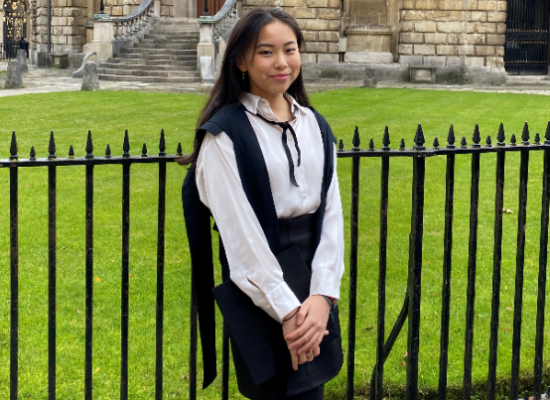
Hi! I’m Cici and I study Spanish at St Catherine’s College Oxford. At Oxford, you can study a modern language with another language, linguistics, history, philosophy, classics, or as I do, on its own as a single language. I chose to pursue Spanish as it allows me to connect with others not only through a language that is shared by a vast number of people, but also through their customs, cultures and literature that form such a significant part of the world.
Literature is central to the course here, especially in first year where the set texts allow for an exploration of Spanish literature through all ages, with works ranging from medieval ballads to Golden Age canons to 20th century Latin American novels; you get a taste of everything! If you choose to study the language on its own, this is furthered with studies in medieval works, short fiction and film. This builds a foundation for you to be able to then narrow your choices in 2nd and final year to select modules to be studied along with literature, such as linguistics, philology, film or gender studies.
Typically, your week will be structured around language classes, lectures and seminars organised at the university level and tutorials organised by your college. You will have one oral lesson and one grammar lesson per week taught by the faculty language teachers in small groups. Usually, there will be around 4-5 lectures during the week but this changes per term based on the texts you are studying. For the Spanish Sole course, the three separate papers are taught through seminars that occur every other week, allowing for a thorough discussion of the lectures we watched and the readings we completed in the previous week. The tutorials that are integral to the teaching at Oxford vary from college to college. At St Catherine’s, we have one literature and one translation tutorial every week. For the literature tutorials, we complete one essay per week to be handed in beforehand and discussed during the tutorial and for the translation tutorials, one translated piece of work and vocabulary to be learnt. Both of these classes are taught in small groups in college where you can freely discuss any aspect of your work as well as any questions you have. In general, the work is definitely manageable, but as a humanities course, it is also very self driven. Therefore time management and organisation can be critical to how much you allow yourself to really explore your subject to its fullest extent!
In regards to the interview, everyone’s experience is always incredibly different! However, it can be expected that for a modern languages interview, generally, you will receive a piece of text in your chosen language (or sometimes even in English!), a dictionary and 30 minutes of preparation time to analyse the piece of text beforehand. The interview might start with a discussion of the piece of text, exploring the general meaning of the text accompanied by a more critical analysis. The interview may then move on to a discussion on certain topics or texts mentioned in your personal statement and your opinions on them. Most of this is usually conducted in English, but there will always be a chance to show your spoken language skills with a few questions asked in Spanish. With the potential of every interview being incredibly different, my biggest tip would be to remember that the professors are there to help you as they want to be able to see the way you process, analyse and express information. Therefore, taking a moment to collect your thoughts, ideas or suggestions can often be better as you will be able to show your train of thought in a clearer manner!
Overall, Spanish at Oxford is a great course that lets you explore the hispanic world, develop skills transferable to many aspects of life and most of all make connections between the language, literature, and culture of a huge part of the world!
